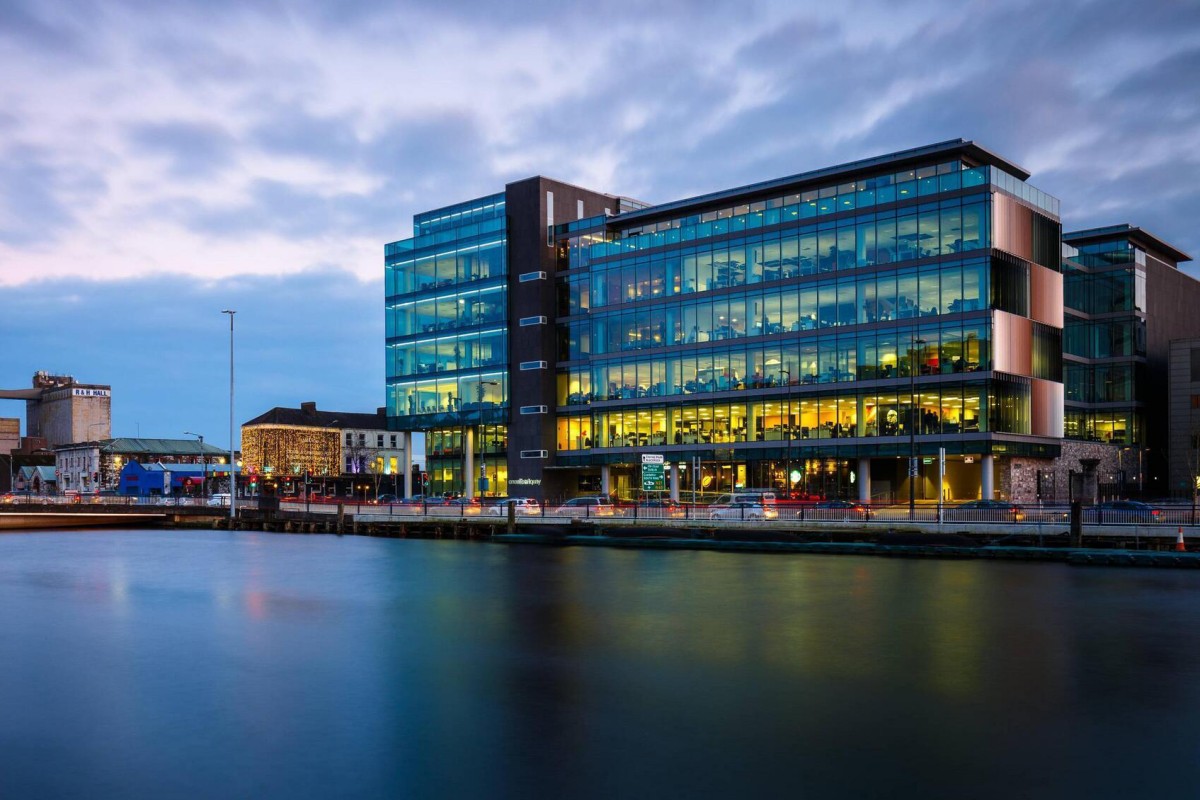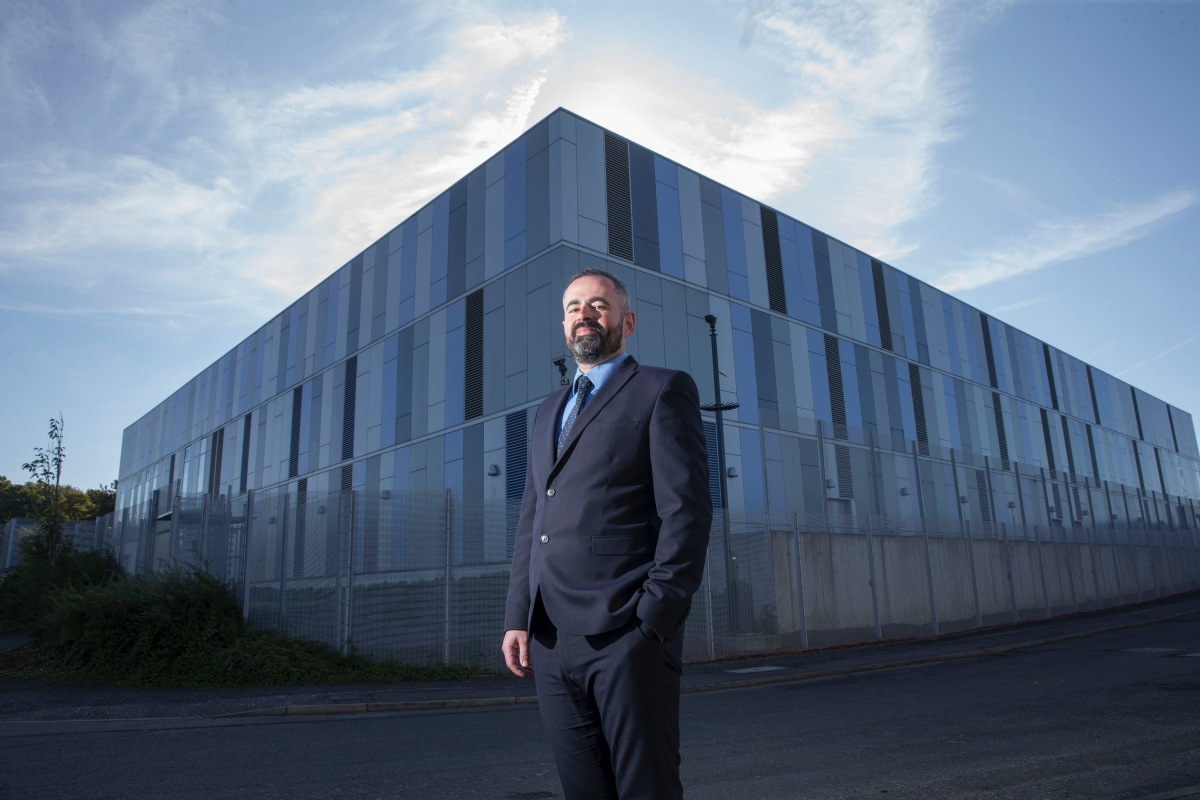Insights into Data Centre Investment & Market Growth
Data Centre Build News & Insights
Data Centre Business News and Industry Trends
Data Centre Projects: Infrastructure Builds, Innovations & Updates
Insights into Data Centre Investment & Market Growth
Echelon secures €1.7bn loan financing for European expansion
Echelon Data Centres, an Irish-headquartered developer and operator of large-scale data centre infrastructure, has announced the successful closing of an initial €1.7 billion (£1.4 billion) in loan financing provided by investment bank and financial services company Morgan Stanley.
The data centre operator says the financing "further strengthens [its] capital base to continue its planned expansion across Europe."
Echelon now has eight campuses across Europe, totalling 1.2 GW of capacity, of which 400MW is operational or under development.
The company notes that this "new multi-billion-euro financing facility enhances [its] ability to scale [its] development pipeline, invest in enabling power infrastructure, and grow [its] campus portfolio across Ireland, the UK, Spain, and Italy."
David Smith, Deputy CEO of Echelon Data Centres, comments, “Ireland is one of Europe’s most important and supply-constrained data centre markets, and we have established the leading position in the Irish market through the delivery of large-scale campus developments supported by innovative power solutions developed in partnership with customers, regulators, and grid stakeholders.
“Over the past 15 months, we have expanded into Spain - in joint venture with Europe’s largest utility, Iberdrola - and into Italy, extending our development model into new strategic markets.
“We are incredibly proud of the growth Echelon has achieved over the past several years and [we are] excited for the opportunity ahead.
"Demand for digital infrastructure across Europe is substantial and long term, and our ambition is to continue expanding our platform to support the growth of our customers in key strategic markets.”
Continuing growth
Charlie Etheridge, Head of Investments at Echelon Data Centres, adds, “This €1.7 billion financing strengthens our capital position and provides the flexibility to execute on our pipeline at scale and at pace.
“It reflects the quality of our platform and the strong institutional support behind our strategy. We are pleased to continue our valued partnership with Morgan Stanley as we advance the next phase of our European expansion.”
Echelon was advised by A&O Shearman and Arthur Cox.
For more from Echelon, click here.
Joe Peck - 24 February 2026
Data Centre Business News and Industry Trends
Data Centre Infrastructure News & Trends
Insights into Data Centre Investment & Market Growth
Liquid Cooling Technologies Driving Data Centre Efficiency
Johnson Controls to acquire Alloy Enterprises
Johnson Controls, a global provider of smart building technologies, has signed an agreement to acquire Alloy Enterprises, a developer of liquid cooling technology for high performance data centres and industrial facilities.
Founded in 2020 and based in Boston, USA, Alloy Enterprises develops direct liquid cooling components designed to improve heat removal and reduce pressure drop in cooling loops. The company states the approach can improve thermal efficiency by up to 35% while lowering cooling system energy use.
The acquisition is intended to expand Johnson Controls’ data centre cooling portfolio, which already includes chillers, coolant distribution units, and waste heat recovery systems.
Liquid cooling capability expansion
Johnson Controls says Alloy’s manufacturing and materials engineering capabilities will complement its existing cooling equipment, including chillers and liquid cooling distribution platforms. The technology is designed to support cooling of GPUs, CPUs, memory, and network interfaces in high density computing environments.
Lei Schlitz, President, Global Products & Solutions at Johnson Controls, says, “This acquisition is about enabling our customers to stay ahead of fast-changing compute demands by adding another core technology that enables us to optimise the overall thermal management architecture of a data centre.
"It will also strengthen our core technology capabilities that can scale across the Johnson Controls portfolio and reinforces our long-term commitment to lead more broadly in advanced thermal management solutions for mission critical applications.”
Alison Forsyth, co-founder and CEO of Alloy Enterprises, says, “We’ll continue to work closely to solve the industry's most urgent challenges in data centres and other mission-critical environments.
"We look forward to this new chapter and continuing to scale with one of the world's most respected and experienced leaders in thermal management innovation.”
The transaction is expected to complete in the company’s fiscal third quarter, subject to regulatory approvals. Financial terms were not disclosed.
For more from Johnson Controls, click here.
Joe Peck - 20 February 2026
Commercial Real Estate: Property Developments, Trends & Infrastructure
Data Centre Business News and Industry Trends
Insights into Data Centre Investment & Market Growth
News
New hyperscaler capacity to outpace colocation in Europe
Data centre capacity owned and operated exclusively by hyperscalers, also known as 'self-builds', in Europe is expected to outpace the growth of colocation supply in 2026, according to new research from real estate services company CBRE.
The latest research shows that hyperscaler self-build capacity across Europe is expected to reach 4.2GW this year, representing 24% year-on-year growth compared to 2025. This new supply will be delivered across nine European countries, marking the seventeenth consecutive year of double-digit expansion for the segment.
Hyperscalers are set to deliver a record level of self-build capacity this year as they expand cloud regions and support increasing volumes of equipment dedicated to artificial intelligence workloads. As of Q4 2025, approximately 60% of Europe's operational hyperscaler self-build capacity is located in Ireland, the Netherlands, Sweden, and Belgium.
By comparison, the top 15 European colocation data centre markets are expected to grow 19% year-on-year. Despite slower growth relative to new hyperscaler self-builds, the European colocation segment will remain significantly larger.
Strong demand endures
CBRE notes that demand for colocation facilities remains robust across Europe. Hyperscalers and neocloud providers continue to rely on developer-operators for rapid delivery, flexible design options, and the ability to secure capacity on shorter timelines.
Andrew Jay, Head of Data Centre Solutions, Europe at CBRE, says, "The hyperscaler self-build segment is growing as hyperscalers are looking to build facilities at scale and control more of the supply chain, the design of the facility, and ensure they have the power necessary."
Kevin Restivo, Director, European Data Centre Research at CBRE, adds, "Traditionally, the fastest route to market for hyperscalers in need of data centre capacity delivered are the developer-operators. We expect this to remain true for the foreseeable future. Hyperscalers will, in some instances, build their own facilities though."
For more from CBRE, click here.
Joe Peck - 19 February 2026
Data Centre Business News and Industry Trends
Data Centre Regulations & UK Compliance Updates
Insights into Data Centre Investment & Market Growth
'UK cannot delay action on power and infrastructure'
The UK must take urgent action to fix systemic issues in energy and infrastructure to sustain its ambition to lead the global digital economy and become an AI superpower, according to a new report published by trade association techUK.
The report, Powering Digital Infrastructure, warns that while demand for data centres and compute infrastructure is accelerating rapidly - driven by AI, cloud, and edge computing - the UK’s energy system is struggling to keep pace.
Without reform, rising electricity costs, grid connection delays, and fragmented policy could force investment overseas, undermining economic growth, innovation, and national resilience.
The current problems
Data centres are now critical national infrastructure (CNI), underpinning everything from financial services and healthcare to research, manufacturing, and public services, all while supporting the Clean Power 2030 Action Plan through Power Purchase Agreements (PPAs) and decarbonised heat.
techUK's 2024 report highlights that the UK data centre sector already contributes billions to the economy and supports tens of thousands of jobs, with the potential to add an additional £44 billion in Gross Value Added between 2025 and 2035, if growth accelerates.
The UK aims to triple compute capacity to around 6GW by 2030; however, this is colliding with structural constraints. Electricity prices for UK data centres are among the highest in the developed world - roughly four times those in the United States and about 46% above the median of 31 International Energy Agency (IEA) countries - while grid connection delays of up to eight years are becoming commonplace.
As a result, techUK’s report identifies several interconnected risks for the UK if the situation remains unchanged, including loss of global competitiveness, grid bottlenecks and delays, and risks to the country's energy security and resilience, which could be compounded by growing geopolitical shocks and tensions.
If left unaddressed, the report warns that the UK will struggle to meet its ambition of being an “AI maker”, weakening sovereignty and long-term economic control.
The proposed solutions
The report sets out a clear programme of solutions to minimise these risks:
• Reform the grid connections process to prioritise committed, non-speculative projects; provide greater transparency over the queue; and offer phased connection agreements that reflect how data centres are actually built.
• Reduce electricity costs for digital infrastructure through levy reform, targeted exemptions, and improved access to long-term power contracts, restoring international competitiveness.
• Accelerate planning and delivery by enabling nationally significant data centre projects to move faster through the planning system and clarifying eligibility for prioritisation schemes.
• Unlock private investment in networks by allowing the private sector to help build and finance grid infrastructure where it can reduce delays and costs.
• Align digital growth with clean power by supporting renewable PPAs, co-location with generation, energy storage, and, where appropriate, nuclear and small modular reactors (SMRs).
• Maximise local benefits by embedding data centres into regional growth strategies, supporting skills development, waste-heat reuse, and supply-chain expansion.
Data centres can be part of the solution, acting as anchor customers for new renewable generation, supporting grid investment, and helping spread fixed system costs across a larger base of electricity demand.
Matthew Evans, COO and Director of Markets for techUK, says, “Economic growth is directly linked to power and our country’s ability to digitise. If the UK is serious about unlocking economic growth, it needs to move decisively to fix energy costs, grid access, and regulatory fragmentation.
"The results will unlock new cycles of investment and support the country’s decarbonisation efforts, as well as both national and regional growth. If we don’t, the UK risks falling behind at the very moment global competition is accelerating.”
Joe Peck - 17 February 2026
Data Centre Business News and Industry Trends
Data Centre Infrastructure News & Trends
Innovations in Data Center Power and Cooling Solutions
Insights into Data Centre Investment & Market Growth
Liquid Cooling Technologies Driving Data Centre Efficiency
Trane to acquire LiquidStack
Trane Technologies, a US manufacturer of heating, ventilation, and air conditioning (HVAC) systems, has entered into a definitive agreement to acquire LiquidStack, a US-based provider of liquid cooling technology for data centres.
LiquidStack, headquartered in Carrollton, Texas, develops direct-to-chip and immersion cooling systems for high-density and hyperscale computing environments. The company’s technology is used to support generative AI and other compute-intensive workloads.
Trane Technologies made a minority investment in LiquidStack in 2023. The proposed acquisition expands its data centre thermal management portfolio, which includes chillers, heat rejection systems, controls, liquid distribution, and on-chip cooling.
Expanding liquid cooling capabilities
The deal includes LiquidStack’s manufacturing, engineering, and research and development operations in Texas and Hong Kong. Following completion, the business will operate within the Commercial HVAC unit of Trane Technologies’ Americas segment.
Holly Paeper, President, Commercial HVAC Americas, Trane Technologies, says, “Rising chip-level power and heat densities, combined with increasingly variable workloads, are redefining thermal management requirements inside modern data centres.
"Customers need integrated cooling solutions that scale from the central plant to the chip and can adapt as performance demands continue to evolve.
"LiquidStack’s direct-to-chip and immersion cooling capabilities and talent, combined with Trane’s systems expertise and global footprint, strengthen our ability to deliver end-to-end, future-ready thermal management across the entire data centre ecosystem.”
LiquidStack co-founder and CEO Joe Capes will join Trane Technologies in a leadership role and will continue to lead the business.
Joe says, “LiquidStack has been on a mission to innovate and deliver the most advanced, powerful, and sustainable liquid cooling solutions.
"Joining Trane Technologies enables us to accelerate that mission with the resources, scale, and global reach needed to power next-generation AI workloads in the most demanding compute environments."
The transaction is expected to close in early 2026, subject to customary conditions. Financial terms have not been disclosed.
Trane Technologies also recently announced the acquisition of Stellar Energy, which is expected to complete in the first quarter of 2026.
For more from Trane Technologies, click here.
Joe Peck - 11 February 2026
Data Centre Business News and Industry Trends
Data Centre Infrastructure News & Trends
Innovations in Data Center Power and Cooling Solutions
Insights into Data Centre Investment & Market Growth
Liquid Cooling Technologies Driving Data Centre Efficiency
Direct-to-chip liquid cooling market to reach $7.9bn by 2033
Rising computational intensity has placed unprecedented pressure on traditional air-based cooling systems. High-performance computing (HPC), artificial intelligence (AI), cloud data centres, and advanced semiconductor architectures generate dense heat loads that are increasingly difficult to manage using conventional thermal management approaches.
According to Research Intelo, a global market research and consulting firm, the global direct-to-chip liquid cooling market was valued at $1.3 billion (£951 million) in 2024 and is projected to reach $7.9 billion (£5.7 billion) by 2033, expanding at a CAGR of 22.3%. This strong growth trajectory underscores the growing reliance on liquid-based cooling technologies to support next-generation digital infrastructure.
Direct-to-chip liquid cooling has emerged as a practical and scalable response to these challenges, offering targeted heat removal directly from processors and other high-power components. By reducing thermal resistance and improving heat transfer efficiency, this approach supports higher rack densities while aligning with broader energy efficiency and sustainability objectives.
What exactly is direct-to-chip liquid cooling?
Direct-to-chip liquid cooling is a thermal management method in which a liquid coolant flows through cold plates mounted directly onto heat-generating components such as CPUs, GPUs, and accelerators. Heat is absorbed at the source and transported away through a closed-loop liquid system, minimising reliance on air circulation.
Compared to immersion cooling, which involves submerging entire systems in dielectric fluids, direct-to-chip solutions integrate more easily with existing data centre architectures. This balance between high cooling efficiency and operational compatibility has positioned the technology as a preferred option for gradual infrastructure upgrades and hybrid cooling deployments.
Which factors are driving market growth?
1. Technological innovation and automation
As processing power and server densities continue to rise, traditional air-cooling solutions are approaching their practical limits, increasing the risk of thermal throttling and hardware degradation. Direct-to-chip liquid cooling technologies provide a highly efficient alternative by enabling precise and consistent heat removal from critical components.
Ongoing innovation in cold plate design, advanced coolants, and system integration is further enhancing performance and reliability. The incorporation of smart sensors, real-time monitoring tools, and automated flow controls enables predictive maintenance and dynamic thermal optimisation. These advancements are making direct-to-chip liquid cooling more scalable and accessible across a wide range of computing environments, from hyperscale data centres to edge deployments.
2. Shifts in end-user accelerating market expansion
The rapid expansion of data-intensive applications, including AI, machine learning, blockchain, and the Internet of Things (IoT), has led to unprecedented heat generation within servers and computing clusters. Enterprises and data centre operators face increasing pressure to maintain high performance and uptime while controlling operational costs and energy consumption.
Direct-to-chip liquid cooling addresses these demands by delivering superior thermal efficiency and reducing dependence on energy-intensive air conditioning systems. The ability to support higher rack densities is particularly valuable in urban data centres and edge locations where space and power constraints are significant. As organisations prioritise sustainability and long-term infrastructure resilience, adoption of liquid cooling technologies is expected to expand across multiple industry verticals.
3. Regulatory support and government incentives
Regulatory frameworks aimed at reducing energy consumption and greenhouse gas emissions in data centres are creating favourable conditions for advanced cooling technologies. In regions such as Europe and North America, government incentives - including tax benefits, grants, and energy efficiency programs - are encouraging the adoption of low-impact thermal management solutions.
In parallel, international standards for green data centre operations are pushing organisations to modernise their infrastructure and improve environmental performance. These regulatory and policy-driven factors are fostering innovation, reducing adoption barriers, and supporting sustained market growth.
What challenges are limiting wider adoption?
Despite strong growth prospects, the market faces several challenges that could impact adoption rates. Regulatory uncertainty related to safety standards, environmental compliance, and fluid handling requirements can complicate deployment decisions. Volatility in raw material prices, particularly for copper and specialised cooling fluids, may also influence production costs and pricing strategies.
Additionally, standardisation gaps and interoperability issues can pose challenges in complex or legacy IT environments. Addressing these constraints will require continued collaboration among technology providers, regulators, and end-users to establish clear guidelines, improve compatibility, and build confidence in long-term system reliability.
Which technologies are shaping product innovation?
Manufacturers are continually refining cold plate designs to improve heat transfer efficiency and compatibility with next-generation processors. Innovations such as microchannel architectures, optimised flow paths, and advanced alloys enable higher thermal performance while minimising pressure drop and energy consumption.
Customisation tailored to specific processor architectures and workload requirements has become increasingly common. This flexibility supports diverse applications across AI, HPC, cloud computing, and enterprise data centres, further strengthening the market’s value proposition.
What regional trends are emerging?
• North America dominates the global market, accounting for over 38% of total market share in 2024. This leadership is driven by a mature data centre ecosystem, advanced IT infrastructure, and early adoption of innovative cooling technologies. The strong presence of hyperscale data centre operators and cloud service providers, particularly in the US, has accelerated deployment across the region.
• Asia Pacific is projected to register the fastest growth, with a CAGR of 27.1% from 2025 to 2033. Rapid digital transformation, expanding cloud infrastructure, and increasing investments in hyperscale and edge data centres are fuelling demand. Countries such as China, India, Japan, and Singapore are witnessing rising adoption of AI and HPC across sectors including fintech, healthcare, and smart cities, further driving the need for advanced cooling solutions.
• Latin America, the Middle East, and Africa are experiencing gradual adoption of direct-to-chip liquid cooling technologies. While infrastructural limitations, budget constraints, and skills gaps have slowed deployment, growing awareness of long-term cost savings and sustainability benefits is steadily improving market outlook in these regions.
What does the competitive landscape look like?
The market features a combination of established thermal management companies and specialised liquid cooling solution providers. Competition is primarily based on cooling efficiency, system reliability, ease of integration, and total cost of ownership.
Strategic partnerships between hardware manufacturers, data centre operators, and cooling technology providers are becoming increasingly common. Continuous investment in research and development remains critical, as cooling requirements evolve alongside processor design and workload intensity.
What is the future outlook for the direct-to-chip liquid cooling market?
The transition towards high-density computing shows no signs of slowing. Market forecasts indicate strong expansion, with the direct-to-chip liquid cooling market expected to grow from $1.3 billion (£951 million) in 2024 to $7.9 billion (£5.7 billion) by 2033, reflecting sustained demand across data centre, enterprise, and research environments.
As processors become more powerful and energy efficiency expectations rise, direct-to-chip liquid cooling is expected to shift from selective adoption to broader implementation. Continued standardisation, declining component costs, and increased operational familiarity are likely to accelerate this transition.
Conclusion: Is direct-to-chip liquid cooling becoming a standard rather than an option?
Direct-to-chip liquid cooling addresses some of the most critical challenges facing modern computing infrastructure. By enabling efficient heat management, supporting high-performance workloads, and aligning with sustainability and energy efficiency goals, the technology is redefining thermal management strategies.
As digital workloads intensify and infrastructure demands evolve, the market’s trajectory raises a defining question: Will direct-to-chip liquid cooling soon be regarded as a baseline requirement for advanced computing environments rather than a specialised enhancement?
Joe Peck - 10 February 2026
Data Centre Business News and Industry Trends
Data Centre Regulations & UK Compliance Updates
Insights into Data Centre Investment & Market Growth
News
UK parliamentarians launch Data Centres APPG
MPs and peers have launched a new All-Party Parliamentary Group (APPG) focused on data centres, examining the sector’s role in economic growth, digital infrastructure resilience, and net zero targets.
The cross-party group is chaired by Chris Curtis MP, Labour MP for Milton Keynes North and Chair of the Labour Growth Group. Other officers include:
• Lewis Cocking MP, Conservative MP for Broxbourne (as co-chair)• Alison Griffiths MP, Conservative MP for Bognor Regis and Littlehampton• Lord Philip Hunt of Kings Heath OBE, former Minister of State for Energy Security and Net Zero
The APPG aims to improve parliamentary understanding of data centre development across the UK, review challenges and opportunities facing the sector, and produce evidence-based policy recommendations.
The group will examine areas including infrastructure delivery, planning considerations, and energy demand linked to sector growth.
The APPG has opened a formal call for evidence, inviting contributions from across the digital infrastructure ecosystem. Submissions will help shape the group’s Terms of Reference and define its areas of focus for 2026.
Stakeholders invited to contribute include data centre operators and developers, energy suppliers, network operators, water providers, investors, consultancy organisations, local authorities, technology providers, trade associations, environmental groups, and academic institutions.
Consultation launched to gather industry evidence
Chris Curtis MP, Chair of the Data Centres APPG, notes, “Data centres are a vital part of the UK’s digital economy, and it is essential that we remain an attractive destination for the investment that drives growth and creates high-skilled jobs.
"As Chair of the APPG, I want to ensure Parliament has the evidence and understanding it needs to shape a balanced approach: one that supports development, delivers real economic benefits, and works for local communities, while recognising wider considerations.
"Getting this right will be critical to securing the UK’s long-term digital future.”
Lewis Cocking MP, Co-Chair of the Data Centres APPG, adds, “Data centre development must work for the communities that host them. Google's £1 billion investment at Waltham Cross is a clear sign of Broxbourne's growing importance as a hub for technology and innovation, and we must ensure this growth delivers genuine benefits for local people.
"This new APPG will focus on ensuring that local voices are heard in planning processes, that developments deliver tangible benefits (such as local jobs and waste heat utilisation), and that the highest environmental standards are met.
"Local residents need to have a real say in projects like these. We'll work to ensure developments like Google's enhance Broxbourne and other local areas while meeting our environmental commitments.”
Lord Hunt of Kings Heath OBE, Officer of the Data Centres APPG, says, “As a former Minister of State for Energy Security and Net Zero, I've seen firsthand how critical it is to align infrastructure growth with our climate commitments.
"Data centres are major energy users, but they're also driving innovation in renewable energy procurement and efficiency.
"This APPG will focus on ensuring their growth supports our net zero ambitions, exploring how these facilities can contribute to clean energy infrastructure, utilise waste heat, and support grid modernisation.
"With the right policy framework, we can build the digital capacity our economy needs while advancing our environmental goals. Data centres shouldn't be seen as a challenge to net zero, but as part of the solution.”
Joe Peck - 5 February 2026
Data Centre Business News and Industry Trends
Insights into Data Centre Investment & Market Growth
News
EUDCA publishes its new 2026 report
The European Data Centre Association (EUDCA), the representative body of the European data centre community, has announced the publication of its 2026 State of European Data Centres report.
Building upon regional benchmarks established in last year’s report, the new data reveals a European market that has moved beyond the era of hub-centric development and is evolving into a distributed, energy-integrated, and AI-driven digital ecosystem.
Europe’s data centre sector is shown to be entering a period of exceptional expansion, structural diversification, and rapid technological transformation, driven by AI hyper-expansion. However, its ability to fully exploit potential growth is threatened by energy availability and access.
The new EUDCA report finds European market growth not only within traditional centres - such as the Frankfurt, London, Amsterdam, Paris, and Dublin (FLAP-D) - but also rapidly decentralising across Southern Europe, the Nordics, Central and Eastern Europe (CEE), and selected Tier2 metros.
Moving from cloud-led growth to AI demand, data centres are now recognised as critical infrastructure underpinning Europe’s competitiveness and security.
Growth and investment in Europe’s data centres
Europe’s IT power capacity grew from 10,539 MW (2023) to 14,784 MW (2025), exceeding forecasts. Furthermore, €176 billion (£151.6 billion) in cumulative investment is expected from 2026–2031.
Within this growth and investment, scale colocation campuses and AI-optimised facilities dominate new builds. A CAGR exceeding 25% through to 2031 is expected for scale colocation, reflecting rising demand for high-density cloud and AI clusters.
Traditional retail and wholesale sites continue to expand, but their relative share of new capacity is declining as customers increasingly require multi-building, AI-ready environments with long-term scalability.
Hyperscale data centre expansion is accelerating into regions with improving access to renewable energy and favourable operating conditions, as training workloads tend to favour regions with abundant power availability such as the Nordics and parts of Southern Europe.
A notable driver of growth is the rise of neocloud, namely providers of ultra-high-density compute with rapid deployment capability and large power tranches aligned with the needs of AI developers, global model providers, and emerging cloud-adjacent platforms.
Constraints and socioeconomic impact
A significant factor affecting the industry is energy availability and access. Power availability is reported as the top challenge for more than two thirds (67%) of operators. Grid congestion and long connection timelines in many geographies are slowing deployment.
Within these developments, AI clusters are pushing extreme rack densities beyond 100kW, calling for changes in data centre design, deployment, and operation, as well as driving a rapid shift towards liquid and hybrid cooling architectures.
The European data centre industry continues to make a significant contribution to the economy and society.
The report finds a €53 billion (£45.6 billion) GDP contribution in 2025, rising to an expected €137.5 billion (£118.4 billion) by 2031, with more than 300,000 direct, high-skilled jobs supported across the ecosystem.
The facilities and campuses also bring local benefits, such as supporting district heating, providing energy grid flexibility services, renewable power purchase agreements (PPA) that support renewable energy development, and community infrastructure.
Sustainability progress and regulatory alignment
The industry’s rapid growth is firmly aligned with climate and regulatory expectations.
The continued application of the Energy Efficiency Directive (EED) marks a new era of harmonised reporting and transparency for the industry. The vast majority (90%) of energy consumed by European data centres is now generated from renewable energy sources.
At the same time, there has been strong progress on water usage effectiveness (WUE), renewable procurement, and heat reuse integration, addressing many of the concerns of the citizenry with regard to data centre facilities.
There are outstanding examples of biodiversity, heat reuse, and community benefit projects across Europe.
Global leadership and the next phase
EUDCA Secretary General Michael Winterson comments, “The exceptional growth of Europe’s data centre market is welcome news at a time when international volatility has focused many geographies on digital sovereignty and security.
“Once the issues of power availability and access are addressed, Europe has the opportunity to lead globally in AI-ready infrastructure, while maintaining the highest standards of sustainability and responsible stewardship.”
The 2026 State of European Data Centres report clearly demonstrates the need for industry, policymakers, and partners to come together on bold steps to accelerate grid investment and permitting reform. This will require deeper and improved cross-border coordination to achieve greater collaboration on energy system integration.
The report states that if these challenges are met, Europe will be positioned not only to accommodate growth in cloud and AI infrastructure, but to lead in the development of a secure, sustainable, and strategically independent digital economy.
For more from the EUDCA, click here.
Joe Peck - 4 February 2026
Commercial Real Estate: Property Developments, Trends & Infrastructure
Data Centre Business News and Industry Trends
Insights into Data Centre Investment & Market Growth
News
nLighten expands footprint through Paris site acquisition
nLighten, a European data centre operator, has announced the acquisition of a data centre in Émerainville, Paris from oXya, a provider of SAP cloud services and managed IT infrastructure. The facility becomes nLighten's eighth site in France and adds to its portfolio of over 30 data centres in seven markets.
Strategically located in Paris's eastern data centre cluster, approximately one kilometre from nLighten's existing PAR1 facility, the site will continue serving anchor customer oXya under a long-term master services agreement, while additional capacity will be made available to enterprise customers via channel partners.
The facility is designed to support high-density and AI-ready configurations, providing scalable infrastructure that evolves with customer requirements.
nLighten says its approach emphasises delivering sustainable, interconnected infrastructure tailored to enterprise needs, with "seamless connectivity between [its] sites."
Expanding digital infrastructure
Harro Beusker, CEO and co-founder of nLighten, comments, "The acquisition of this Paris data centre represents a significant expansion of our French footprint and strengthens our position in one of Europe's most dynamic digital infrastructure markets.
"Paris is a critical hub for regional connectivity and this facility enables us to deliver enhanced capacity and resilience to our enterprise customers. The proximity to our existing Paris sites creates operational synergies while also allowing us to support dual-site deployments.
"This acquisition exemplifies our strategy of building smart, sustainable infrastructure that scales with customer needs and contributes to the digital transformation of European businesses."
Anwar Saliba, Managing Director at nLighten France, adds, “This acquisition fully aligns with our ambition to build a distributed, locally operated digital infrastructure across France.
"By adding capacity in the Paris region through three interconnected sites, we provide our customers with the conditions needed to deploy more resilient architectures, better secure their data, and meet growing requirements in terms of performance, service continuity, and digital sovereignty."
Christophe Bronner, Group Chief Financial Officer at oXya, states, "We are pleased to see this data centre continue its evolution thanks to the partnership with nLighten.
"This transition allows oXya to focus on its core business of delivering managed cloud services and consulting to our customers, while ensuring continuity and enhanced capabilities for our infrastructure needs.
"We believe nLighten's expertise and commitment to sustainable operations will benefit both our organisation and the broader customer community.”
For more from nLighten, click here.
Joe Peck - 2 February 2026
Data Centre Build News & Insights
Data Centre Business News and Industry Trends
Data Centre Projects: Infrastructure Builds, Innovations & Updates
Insights into Data Centre Investment & Market Growth
DataVita's North Lanarkshire site named AI Growth Zone
Data centre and cloud services provider DataVita's North Lanarkshire site has been named a UK AI Growth Zone, unlocking £8.2 billion of private investment for the region - one of the largest technology commitments in Scottish history.
The project brings together three integrated components: 500MW of AI-ready data centre capacity, over 1GW of private wire renewable energy infrastructure, and 'innovation parks' designed to attract next-generation industries.
Over 3,400 jobs will reportedly be created in the coming years, from immediate construction roles through to permanent positions in data centre operations, renewable energy, and AI-related fields.
Site details
DataVita is building 500MW of hyperscale data centre capacity optimised for AI workloads. The facilities use closed-loop cooling systems with near-zero water consumption and will operate at a power usage effectiveness (PUE) of 1.15.
Over 1GW of renewable energy - wind, solar, and battery storage - will be developed on private wire connections directly to the data centres. The system will be grid positive, exporting surplus clean energy to the national grid.
Power costs will be sub-10p per kWh, with carbon intensity under 5 gCO₂e/kWh - 97% lower than the London grid average.
Purpose-built 'innovation parks' will provide the physical infrastructure for next-generation industries. The development includes laboratory space, robotics research facilities, and advanced manufacturing units, aiming to attract companies and researchers who need proximity to AI compute at scale.
The goal is to create a thriving ecosystem where the anchor investment draws new businesses and hundreds of additional jobs to the region.
A community fund will also deliver over £543 million to North Lanarkshire over the next 15 years, supporting skills and training programmes, local charities, and community initiatives. The fund will be governed by an independent board with local representation, ensuring the community decides how the money is spent.
Additional commitments include 50 apprenticeships and an AI Venture Fund backing Scottish startups.
Eco-conscious development
DataVita claims the AI Growth Zone will be one of the most sustainable AI infrastructure developments in the world. The system is grid positive, with renewable sources to generate more energy than the data centres consume.
Carbon intensity will be 97% lower than other major UK data centre hubs and with almost zero water waste.
Technology Secretary Liz Kendall comments, "Today’s announcement is about creating good jobs, backing innovation, and making sure the benefits AI will bring can be felt across the community.
“From thousands of new jobs and billions in investment through to support for local people and their families, AI Growth Zones are bringing generation-defining opportunity to all corners of the country.”
Danny Quinn, Managing Director of DataVita, adds, "Scotland has everything AI needs: the talent, the green energy, and now the infrastructure. But this goes beyond the physical build.
"We're creating innovation parks, new energy infrastructure, and attracting inward investment from some of the world's leading technology companies. This is a real opportunity for North Lanarkshire, and we want to make sure local people share in it.
"The £543 million community fund means the benefits stay here: good jobs, new skills, and investment that actually reaches the people who live and work in this area."
For more from DataVita, click here.
Joe Peck - 29 January 2026

Head office & Accounts:
Suite 14, 6-8 Revenge Road, Lordswood
Kent ME5 8UD
T: +44 (0)1634 673163
F: +44 (0)1634 673173









